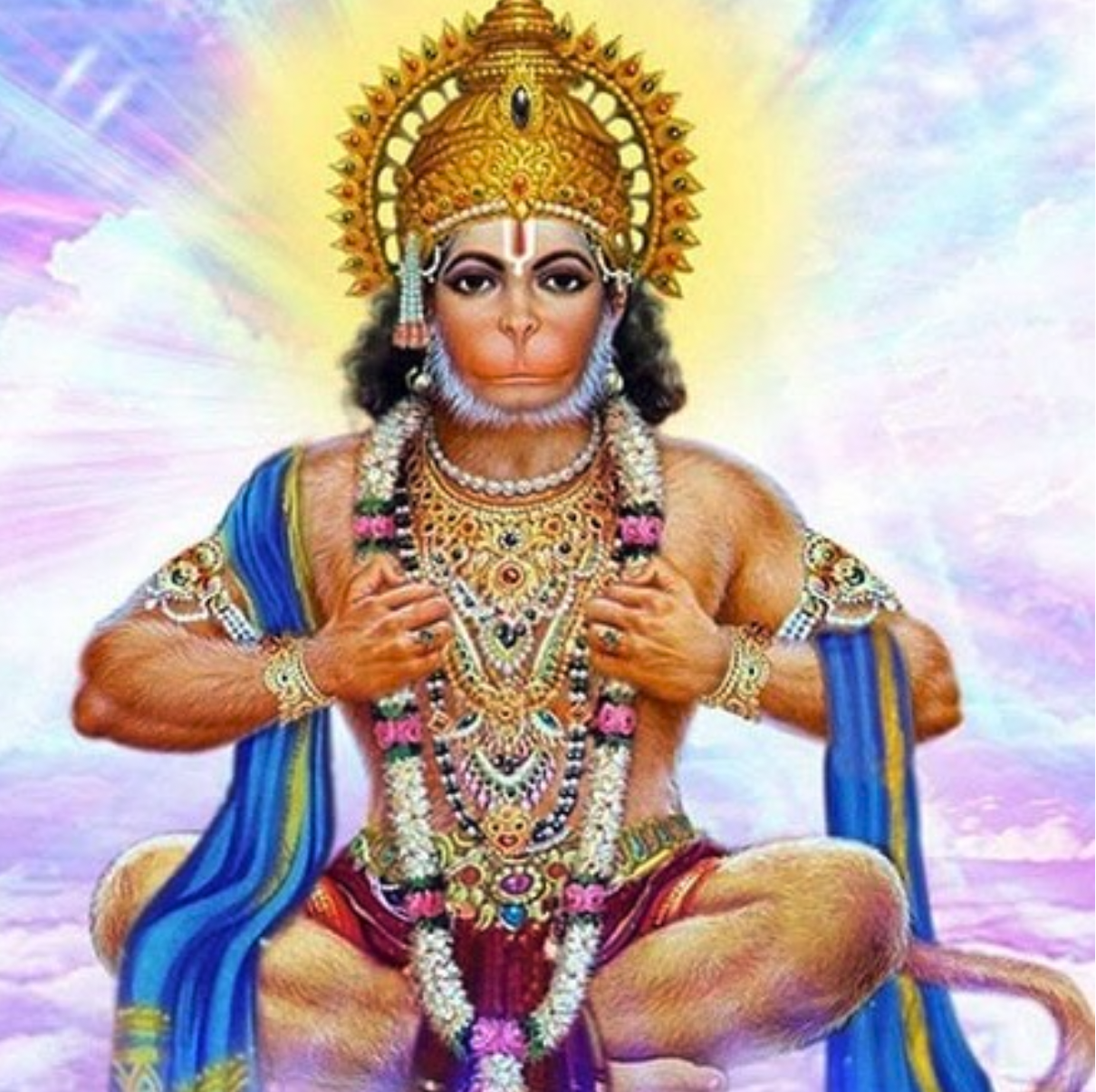
Podcast: Play in new window | Download
Subscribe: Apple Podcasts | Spotify | Amazon Music | Email | RSS
Call and Response Ep. 63 Hanuman, How Chanting Heals
Q: Can you tell us a story about Hanuman? Any story.
“There are certain things that we need that, that Being that is Hanuman allows us to realize in our lives to get what we want. Why shouldn’t we have what we want? God is not your mother telling you, “You can’t have that.” That’s a program. We have desires based on our karmas and many of those desires are good for us to fulfill. Some of them are not. Hanuman boosts up the ones that are positive and removes the ones that are negative.” – Krishna Das
Q: Can you tell us a story about Hanuman? Any story.
KD: What’s that?
Q: Tell us a story about Hanuman. Any story.
KD: Well, stories you can read in books. For us, when we got to India, we noticed that Maharajji’s devotees considered to be Hanuman in the body. Considered Him to be a manifestation of Hanuman. When we talk about these things, it’s very difficult to talk about these things correctly. And even Maharajji used to say, “They say Hanuman’s a monkey.” Hanuman is the flow of grace in the universe. It’s the flow of connection between the individual soul and the supreme soul. The nature of those two supposed things is not different. The Atma is not different than the Paramatma in its quality, except that it’s limited to an individual reflection. For instance, the moon is reflected in many different lakes and pools. It’s exactly the same moon. It’s exactly the same reflection. But it’s limited in some way. That’s the soul. The personal individual soul. And a lake is like a mirror. It reflects the light of the moon, which itself is a mirror reflecting the light of the sun. So, if that lake is covered with leaves and stuff, you can’t see any moon in the lake. Hanuman is what removes those leaves. That dirt on the mirror of the heart. It’s the flow of love, the flow of grace. Hanuman is considered to be the remover of obstacles, the destroyer of problems and suffering. And also, the bestower of the very things we need to get on with our lives. There’s a sloka in Sanskrit which I don’t remember, but it said, “Not only does Hanuman bestow liberation by uniting the Atma with the Paramatma or removing… and he does that by removing the dust on the mirror, not only does He do that, but He also makes it possible for us to satisfy the desires that we have that need to be satisfied.” We’re hungry people. We’re hungry beings. We need to eat. We need to sleep. We need to do a bunch of things. Which I won’t talk about here. And if we don’t do those things, we’re frustrated, and we don’t, our energy doesn’t flow. So, there are certain things that we need that, that Being that is Hanuman allows us to realize in our lives to get what we want. Why shouldn’t we have what we want? God is not your mother telling you, “You can’t have that.” That’s a program. We have desires based on our karmas and many of those desires are good for us to fulfill. Some of them are not. Hanuman boosts up the ones that are positive and removes the ones that are negative. That’s what they say.
Here’s a story you won’t like.
It’s from the Valmiki Ramayana. There’s many different versions of the story of Ram, which is called the Ramayana. So, in the Valmiki, which is the original, Seetha, Rama’s wife, was stolen by the demon Ravana. Seetha is the individual soul. Ram is the Supreme soul. Ravana is the ego. So, He steals the shakti. But He can’t mate with it, because He’s cursed. That if He tries to mate with a woman who doesn’t want Him, His heads will explode. He had ten heads. Every one of them will explode. So, He has to kind of seduce the soul into falling in love with Him, which is impossible. So, anyway, at some point in the story, Hanuman goes, all the monkeys go out to try to find Seetha and Hanuman jumps over the ocean and He gets to Ravana’s kingdom and He’s cruising around looking for Seetha. And one of the places He winds up looking is in Ravana, the Demon’s harem. He had hundreds and hundreds and hundreds of women there. So, Hanuman has to go look. So, He’s going, looking around, and He’s seeing all these women asleep at night, you know, naked and drunk and everything and Ravana’s lying there and He’s looking around and all of a sudden, He flips out and He says, “Oh, my God. This is sin. I’ve sinned. I’ve been looking at these women like this. How could I do that? This is terrible. What am I going to do?” And He really starts to completely flip out. And then, He says, “Wait a minute, wait a minute, wait a minute. I’m not doing this out of any kind of lust or anything. I’m trying to serve Ram by finding Seetha. So, there’s no way there’s any bad karma for this.” And He chills Himself out. He had to talk Himself down. Just like us. You know, like, you get stuck in something and you think, oh, this is terrible. You have to talk yourself down sometimes. You have to say, “Ok, would you chill out please. Hello. Are you in there? Listen to me. It’s ok.” So, That was interesting, the first time I read that. Because I, in different versions of the Ramayana, that doubt that Hanuman had temporarily would never be written about. So, it was very cool.
I’ll think of something else. Hold on.
After finding Seetha, Hanuman comes back and all the monkeys go to see Ram and tell Him the good news. And the king of monkeys tells Rama, “Oh Lord, it was Hanuman who jumped over the ocean and found Seetha and now has come back to tell us.” So, Ram reaches down and He embraces Hanuman. He tries to lift Him up, but Hanuman was so absorbed in love that wouldn’t, couldn’t rise. And Ram says, “The debt I owe to you, I can never repay.” And Hanuman says, “Just let me remain ever your servant and ever to serve the love that You are.” There’s a beautiful, beautiful song that, in Hindi they’re called bhajans, and the line that’s repeated over and over, and it tells the story of when the war’s over and the demons are killed and Seetha’s freed and everybody comes back to the kingdom, Ayodhya and Bharat, who is Ram’s brother, who has been taking care of the kingdom while Ram has been away, He comes out to meet Him and He sees this monkey and He says, “Oh, Lord, what’s this monkey doing here?” And then Ram says, “Oh, Brother Bharat, we can never repay the debt we owe to this monkey.” And each verse describes one of the things that Hanuman did, and again, it ends with the phrase, “Oh, Brother Bharat, we can never repay the debt owe owe to this monkey.” “He jumped across the ocean. He killed the demons. He found Seetha. And not once, not for one second, did pride arise in His mind. Not for one second did He think, ‘I am doing this.’” He was living in the Reality that God is the doer. We live in the Reality that we are the doers. Good luck. Hanuman was not fooled by the ego. He had transcended all of that. And so, He never thought, “I’m doing this. Look what I’ve done.” He jumped over the ocean. He did all these things and not for one second did He ever think that He was the doer. He saw Reality, which is that everything is done within that universal Presence which is God. And one of the last lines of the song, which was written by Tulsidas, He says, Tulsidas says, “I’m telling you this story in the very words that came from the Lord’s mouth. In the very words that Ram spoke. This is what I’m telling you.” It’s just a beautiful bhajan. When I first read the Tulsidas Ramayana, which is the devotional telling of the story, it completely rewired my brain. We are wired for romantic love, for physical love, for love between two people. But when you read these books, you enter into a different field of Being. You enter into a different type of love, a love that is not personal. It’s universal. It’s everywhere all the time. It’s not self-centered. It’s not about “me.” And it’s not about, it transcends that “me-ness.” It blows it out of the fucking sky. It just destroys that separateness. It’s a different kind of love. Maybe it’s the same love but not limited just like the reflection of the moon is limited by a lake or a pool. It’s the whole thing and we come into contact with that through these stories and when I read Tulsidas Ramayana, which is called the Ramacharitamanasa, the Lake of the Stories of Ram, and every chapter is a descent deeper into that lake. It rewired me. I had no idea that this existed like this. And it was mind-blowing. And then I went to India where everybody I met lived in that world, or so many of the people I met. It was amazing. That lives within us once again as what’s really in there already. And when we look for love in our daily lives, we’re really looking for that. But it’s the looking that counts. It’s the seeking that counts. So, somebody was asking about something. One of the things that Siddhi Ma said to me, I said to Her, “Ma, is it all grace? Or is it personal effort?” This is a big thing. They write millions of books about this. I was saying, you know, “If it’s already done, then what do I have to do? I just have to be here, right? I don’t have to do anything. Or, do I have to really make it happen?” She said, “It’s all grace. But you have to act like it isn’t.”
That’s so great.
It is a done deal. We are in time. So, there’s now, then there’s later, then there’s later. We’re into this, we’re into that. If time, if we were now living in the now, which, it’s always “now” if you think about it. When is it now? It’s now. Tomorrow, if you ask the same question, it’s now. It’s always now. But we live in a different level where time passes. On that level, we have to do practice. On the other level, nothing to do, you know, where’d it go. But we’re not living on that level. We’re living within that level, but we don’t experience that. We still suffer. We still don’t have what we want. So, that’s why we have to do some practice. It’s all grace. It’s raining everywhere. Suzuki Roshi said, “Come walk with me in the rain, but don’t rush. Don’t hurry. It’s raining everywhere.” And if we want to catch some of those raindrops, we have to cup our hands. That’s practice. You don’t cup, you don’t get anything to drink.
The changes happen off the radar. We don’t notice. Just naturally you’re drawn to different things and you’re not drawn to other things. Places you used to go, things you used to do… the interest drops. You don’t notice that. But little by little, you wind up living in negativity less of the time. You spend less and less time in negative states of mind. But how could you notice that? Because it’s not like… it’s the “you”, the part of you that’s negative that’s not there, you don’t notice that, but as time goes on, you can look back and you can see a little bit, “Well, you know, my life isn’t as tortured as it was. I don’t spend so much time moping around.” It’s a really big thing.
Q: Hi
KD: Hi
Q: How does chanting heal like, the deep trauma, PTSD, stuff, like generational, all that, that you were talking about?
KD: All that stuff, you could say is dust on the mirror of the heart. When you look and when you look out at the world, what you see is your version of that world. Certain things are scary. Certain things aren’t. Certain things are attractive. Certain things aren’t. Etcetera. You’re like, “This is good. This is bad. This is tasty. This is not. This is ugly. This is beautiful.” We’re seeing our version of everything. As we practice, as we do, as we chant, for instance, the knee-jerk reaction that glues us to our feelings and thoughts has loosened up, little by little. And I say, “knee-jerk,” because you don’t get a vote. You just, we see it the way we see it. And that’s it. We’re in it. So, as time goes on… for instance, it’s as if you were born with… let’s say you’re born at night, ok? And it’s like, a night that lasts for 30 years. So, you’re born and you grow up in the dark, and everything is kind of murky and not distinct and you see things and you just assume that’s the way it is, right? Why wouldn’t you? Right? That’s the way you were born. That’s the way things are. But then, all of a sudden, the sun starts to rise. And just a little light comes into the sky and things look different. And the sun keeps rising and things look different. Trees that looked like scary demons just look like trees. Things change. That’s how practice changes things from the inside out. What we actually see, think and feel starts to change. Our subjective version is thinned out little by little. Of course, we come up sometimes against some big boulders of stuff and that may take more techniques to lighten them up, to loosen that glue up. So, anything we do in therapy, counts, like practice, anything that we do that loosens up the tightness of the way we see everything and believe everything we see. You have no doubt. I have no doubt that when I look around, this is the world. This is my world. Right? I look at you and I see your hair. I see the way you hold your head. I see the tenor of your voice. I get a lot of information from that, but I interpret that information. That’s who she is. She’s a person that… blah blah blah. I don’t know who you are. I don’t know what you think. But I’m stupid enough to think that I know who you are. Just because I see you a particular way. And we all do that. It’s not stupid. It’s just the way we are. So, through practice, we become more receptive to information in a way and not so evaluative about everything, immediately. And so, and I’m talking about, so-called internal emotions, too. Like trauma and things like that. Damage. Same. Because that’s not, that’s also outside of our true nature, so to speak. It’s within our true nature, but it’s, it’s a thing, it’s a program. So, everything you do, every time you plant a seed of letting go or of coming back, that strengthens your inner heart and it loosens up the hold that those programs have over us. How’s that?
Q: Thank you.
KD: Ok. And it may be that as you develop, as you mature, as you ripen, you’re able to deal with that trauma differently. It’s not like it’ll just go away, you know? But all of a sudden, not all of a sudden, but little by little, you’re able to work with it in a different way. You’re not so threatened by it. You’re not so hurt by it immediately. So, you have a little more space in there where you can allow that to kind of rise up and then hopefully just vaporize as time goes on. But we need all the help we can get. That much is for sure.




I don’t know if KD sir will read this , but I have to say it you have changed my life and as being born in Hindu family , I never felt spirituality like as I feel through your bhajans . Thankyou so much for everything.
Thankyou Thankyou 🙏
And I really want to meet you and want to sing bhajans with you .
I don’t if that will gonna happen but I can pray
to lord Hanuman ji that I can meet you soon .
So true
Thank you so kindly ❤️ I look forward to meeting with you, I am live with you every Thursday. Also your course on devotional chanting. Become closer to Hanuman and devotion,, learning more and becoming closer to everything 🙌🏽 🌠 So much ❤️ love ❤️
Namaste 🙏🏼🌹❤⚘️
Hi kd sir
U have changed my life u have made me closer to hanuman ji
Would love to meet u someday in my life and touch ur feet nd take ur blessings
Thanks 🙏🏼 🙏🏼
Jai Shri Hanuman!!
Thank you KD, kindly accept my gratitude for every word of yours, knowledge you share, teachings its wonderful experience to read and remain in the thoughts..
Thank you Krishna Das for bringing me closer to hanuman ji and Maharaji. Can’t wait to attend your kirtan in Amsterdam soon. Your bhajans changed the way I look at life, thank you.
Thank you. Time to heal my heart ❤️